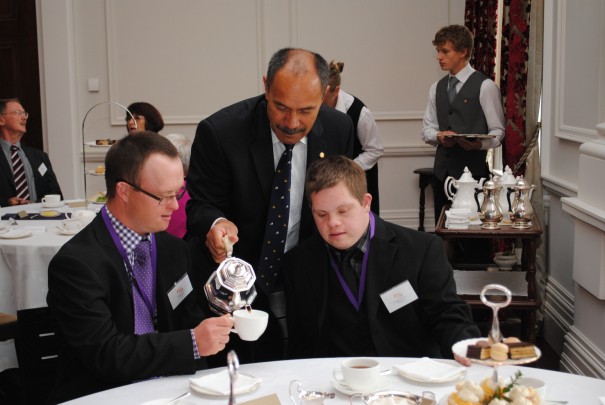2012 T4T World Down Syndrome Day Celebration and the NZDSA National Achievement Awards

For more photographs, click here.
E nga mana, e nga reo, e nga iwi o te motu, e huihui nei, tēnei aku mihi māhana ki a koutou. Kia ora tātou katoa. Distinguished guests, New Zealand Down Syndrome Association staff, award recipients, ladies and gentlemen, girls and boys, warm greetings to you all.
I specifically acknowledge: Neville Strong and Zandra Vaccarino, President and National Executive Officer respectively of the New Zealand Down Syndrome Association - tēnā korua; Paul Gibson, Human Rights Commissioner with responsibility for disability issues - tēnā koe.
As Patron of the New Zealand Down Syndrome Association, it’s a great pleasure for me, together with Janine, to welcome you all to Government House this afternoon.
Last year Janine hosted and gave her first speech on my behalf at the annual Wellington Down Syndrome Association Francis Clarke Memorial Awards, and it is great that she can continue that connection by pouring the first cup of tea in a short time!
Today we gather for a number of reasons. First and foremost, today the 21st day of the 3rd month, is World Down Syndrome Day. The date signifies the uniqueness of Down syndrome in the triplication of the 21st chromosome.
Secondly, we gather today to share High Tea, as part of the nationwide T4T events.
Most importantly, we are gathered here today to celebrate the achievements of three very special people: Michael Holdsworth, Edward Borkin, and Thomas Sadgrove.
Before we move to the National Achievement Awards, I would like to make a few brief comments on the significance of today, and why it is important to be an inclusive community.
According to Statistics NZ, there were 61,400 live births registered in New Zealand in the year to December 2011. Of those babies it is expected that about one in every thousand was born with Down Syndrome. The condition is never anyone’s fault, it just occurs, and still we don’t know why it happens. What we do know is that there is no cure as such, it is a life-long condition that delays learning and development.
Those born with the condition didn’t have a choice. However, as a community, we have the choice to embrace and include them as contributing members of our society. It is the right thing to do and I think it is a good thing to do. As Nelson Mandela said: “Disabled children are equally entitled to an exciting and brilliant future”.
And while we have come a long way over the years on the road to achieving fair opportunities, those with Down syndrome, and their families, face many challenges. World Down Syndrome Day plays an important part in raising public awareness. Educating the more than 4 million New Zealanders is an essential part of ensuring nationwide community support for those of our New Zealand family living with the condition. It also serves to communicate to the wider world the quality of our society.
On behalf of all New Zealanders, I thank the New Zealand Down Syndrome Association for the work it does in promoting the participation of people with Down syndrome in our communities. It seems to me that you are an organisation that protects things that are important to New Zealanders – the appeal of living in a country where the protection and welfare of vulnerable members of our community and their access to a fair and participative life are upheld.
As the recipients of this year’s National Achievement Awards demonstrate, people with Down Syndrome can achieve, and they can contribute to our society if we, the wider community, give them the opportunity.
The recipients of today’s awards have been able to do exciting things and I’m sure they will have brilliant futures, just as Nelson Mandela suggested they could.
Kia ora huihui tātou katoa.
